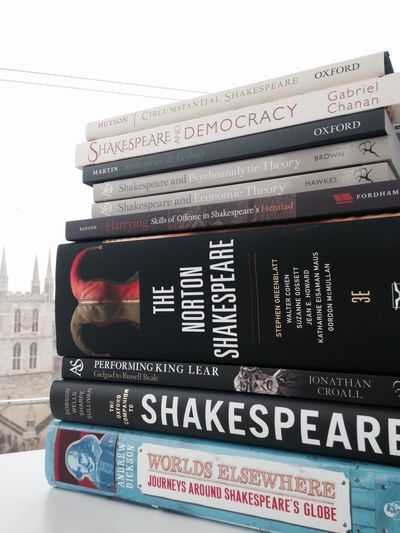Why this Shakespeare chatter?
By MICHAEL CAINES
The novelist Kamila Shamsie suggested in the summer that 2018 could be a year of publishing only women ��� which I'd be very happy with, if her male counterparts could find alternative employment for a little while (it would do some of them a lot of good) ��� but first, please can we make 2017 a year of avoiding one particular long-dead male author?
I recently participated in a debate at the Barbican, "Why Does Shakespeare Matter?", as part of the Battle of Ideas that Andrew Irwin has already written about on this blog. At the time, I had read only a little of the book at the bottom of the pile pictured above. (Take a moment to admire this paper monument, if you please ��� and note how Southwark Cathedral, which Shakespeare would have known well, is artfully dwarfed in the background.) Since the debate, for every few pages of progress I've made with Worlds Elsewhere: Journeys around Shakespeare's Globe (that slowness being no reflection on Andrew Dickson's writing, by the way; just on my current bear-of-little-brain state of mind), another Shakespeare book has arrived.
So here they are: new studies from Oxford University Press and Fordham University Press, Bloomsbury and Troubador; and dominating the lot, the Norton Shakespeare, now in its third edition. I'm about forty pages into Worlds Elsewhere and, assuming I read on at the current rate of progress, about 5,700 pages from the end of Circumstantial Shakespeare.
Of course, TLS HQ is full of books. Your humble paperbacks, your not-so-humble studies of Alice in Wonderland in three enormous volumes ��� they're all here. But this is a kind of flash flood; and I'm pretty sure, at least in terms of review copies submitted, that there is only one author who could have inspired it. (As a commissioning editor, I look out for such things, in case two or more books on the same theme, published around the same time, can be neatly reviewed together.)
Yet wasn't it merely a couple of weeks ago that the TLS led with John Kerrigan's review of 1606 by James Shapiro? Didn't we start the year with Shakespeare's heralds, Shakespeare on Capitol Hill and Shakespeare's Princes of Wales?
And isn't next year going to be the year for the World Shakespeare Congress, Shakespeare400, Shakespeare Oxford 2016 . . . you get the idea. Just say yes. Resistance is futile ��� not least as a new flood of new titles threatens. Mixing the serious with the frivolous and the downright fictional, all are to mark the 400th anniversary of the death of an upstart crow. Here's just a sample to whet your appetite or send you running for the Bard-less hills (be suspicious of any publisher who uses the B-word, of course):
The National Archives: Shakespeare unclassified; Shylock Is My Name by Howard Jacobson; I Love Shakespeare: 400 fantastic facts; The Oxford Dictionary of Original Shakespearean Pronunciation; Hamlet: Fold on fold; The One King Lear; Shakespeare's Yoga: How the Bard can deepen your practice ��� on and off the mat; Shakespeare and the Stars: The hidden astrological keys to understanding the world���s greatest playwright; How To Love: A biography of Shakespeare���s immortal Rosalind; 1616: Shakespeare and Tang Xianzu's China; Will's Words: How William Shakespeare changed the way you talk; A Smidgeon of Shakespeare: Brush up on the Bard with lists, facts and fun &c &c &c.
There. Did you spot the frivolous ones?
The debate itself, incidentally, was a much more interesting affair than I could have hoped for. All I'd come prepared to offer was a rather curmudgeonly, backwards-looking account of Shakespeare today as the product of innumerable acts of rewriting, suppressing, excising, fragmenting and wilfully misinterpreting ��� my own small contribution to the Shakespeare industry is, after all, a book that's largely about eighteenth-century acts of creative (or sometimes downright unimaginative) adaptation of Shakespeare.
Fortunately, there were others on the panel ��� notably Professor Kiernan Ryan ��� to point out the manifold possibilities in Shakespeare, the still (still!) as yet untapped potential. It was a forward-looking, hopeful message. I suppose you (meaning me) could see a flash flood of literary criticism as testament to that heartening idea ��� and be grateful for it.
(Although I still think it's really Marston400 in 2034 and the World Ben Jonson Congress in 2037 people should be holding on for.)
Peter Stothard's Blog
- Peter Stothard's profile
- 30 followers




